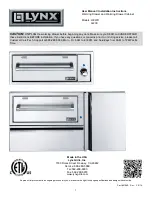
10
11
English
English
Note:
too much foam will also be generated if the tap handle is opened just slightly or slowly;
several beers can be dispensed in sequence when the tap handle is open. The beer will flow
out more slowly after the first glass has been filled.
Step 3 – Beer in the glass
Place the glass of beer on the drip tray and wait for the foam to settle
-
fig. 22
.
Step 4 – The quality of a glass of beer
An excellent draft beer has the following characteristics:
1. a foam of about 3 cms;
2. a head evenly distributed around the wall of the glass that adheres to the surface of
the beer;
3. The beer must be clear with bubbles.
4. a temperature of 4°C to 6°C (in the glass).
Note:
to prevent excessive foam from forming, always use a pre-chilled Beertender
®
Keg and
a clean glass rinsed in cold water.
CLEANING
In addition to routine cleaning, the Beertender
®
should be cleaned after daily use and when
you install a new Beertender
®
Keg.
Keep the ventilator grill located behind the machine clean and dust it regularly using a vacuum
cleaner.
CLEANING AFTER DAILY USE
The drip tray and grid should be cleaned after every use. Remove the grate before emptying
out the drip tray. The grate must be set back in place during normal use of the Beertender
®
-
fig. 23
.
Note:
You can wash the drip tray with warm water and a mild detergent.
Note:
Never use aggressive cleaning agents such as vinegar, acids, solvents or petrol.
CLEANING AFTER INSTALLATION
OF A NEW BEERTENDER
®
KEG
When you install a new Beertender
®
Keg you must clean the dispensing spout. The spout is
the only part of the appliance that comes into contact with the beer -
fig. 24
.
It is essential to wash the dispensing spout using hot water.
Note:
the dispensing spout comprises plastic and metal parts that are permanently joined
together and do not pose any problems of hygiene. Do not attempt to separate these parts.
The beer dispensing mechanism must be cleaned using a damp cloth and a mild detergent
-
fig. 25
.
READY-TO-TAP LIGHT INDICATOR
There is a light indicator at the front of the appliance (
fig. 19
) that provides
important indications :
The light indicator is blinking a few seconds : it indicates the appliance has just been plugged
ON and starts operating.
The light indicator is fixed WHITE when the cooling function is operating to cool down the
temperature of the BeerTender Keg.
The light indicator switches to GREEN when the BeerTender Keg has reached the ideal
temperature.
SOUND EMITTED BY THE BEERTENDER
®
APPLIANCE
The cooling function of the Beertender
®
produces sound.
The Beertender
®
features a cooling system which controls the temperature of the Beertender
®
Keg. There are two cooling modes:
1. stand-by cooling corresponds to keeping the keg cold. In this mode the cooling fan
produces a barely audible noise;
2. active cooling is triggered when temperature inside the cooling chamber is too high.
Once the beer keg reaches the target temperature, the beer machine shifts into standby
cooling mode.
DISPENSING BEER
Note:
always check the “best before end” date shown on the bottom of the Beertender
®
Keg.
Do not use the Beertender
®
Keg beyond this date.
Note:
the beer must be dispensed into suitable containers; the dispensing function is started
and stopped manually by the user.
Step 1 – Preparing a glass
To pour a perfect glass of beer, it is essential to use a clean, fresh glass. Rinse the glass in cold
water before dispensing beer (the colder the glass the better) -
fig. 20
.
Tip:
we recommend that you use your beer glasses for drinking beer alone. Some beverages,
like milk, leave a small residue in the glass which will reduce the head on your beer.
Step 2 – Dispensing beer
Position a glass beneath the tap, holding it at an angle of 45 degrees (see picture) -
fig. 21
.
Firmly and quickly pull the handle down as far as it will go. Let the beer run into the glass.
Avoid contact between the dispensing spout, the glass and the beer already in the glass. This
could cause excessive foaming.
Note:
every time you install a new keg in the Beertender
®
, the first glass of beer will fill up with
too much foam. When this occurs, allow the glass to stand on the drip tray. As soon as the
foam has settled, continue filling the glass.









































